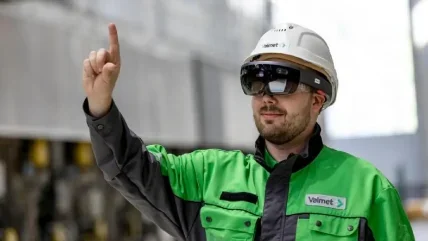
On 27 September, Valmet announced it had signed a 175 million loan with the EIB linked to its research and development activities over the period 2023-2026 and focused on technologies that replace fossil fuels with renewables.
The financing aims to enhance the resource and energy efficiency as well as the performance of Valmet’s technology, promote the use of recyclable raw materials and improve the sustainability of Valmet’s operations, the Finland based company says.
Valmet’s R&D spending was 95 million euro in 2022. It has 28 research and development centres around the world and approximately 1300 protected inventions.
The financing is part of EIB’s dedicated package of support to REPowerEU — the EU plan to eliminate its dependence on fossil fuel imports.
Another recent example of a significant EIB initiative that will help further the objectives of REPowerEU was the agreement, also signed in September, to co-finance the construction of Poland’s first offshore wind farm, via a loan of up to €610 million. Some €350 million if it is backed by the InvestEU programme, which aims to mobilise public and private investment for EU policy priorities, including the green transition.
The 1140 MW Baltic Power project is the first EIB funded offshore wind farm in Poland. It is expected to be completed by the end of the second quarter of 2026. The wind farm will consist of 76 wind turbines plus foundations, two offshore substations, one onshore substation, four export cables, plus inter-array cables. It is located 23 km north of the Polish coastline, within the exclusive economic zone of Poland.
With this project, Poland will join Germany and Denmark in the group of EU countries operating offshore wind farms in the Baltic Sea basin.
EIB is providing a direct loan to Baltic Power LLC, a special purpose entity owned by ORLEN (51%) and Northland Power (49%).
The EIB is the long-term lending institution of the European Union and is owned by the EU Member States.
In July it announced that it was increasing its financing volumes for clean energy to a fresh record and expanding its targeted, extraordinary support to the build-up of manufacturing capacity for state-of-the-art strategic net-zero technologies and products. A new funding package was approved designed to make a substantial contribution to the objectives outlined in the European Commission’s Green Deal Industrial Plan for the Net-Zero Age, EIB said.
EIB’s board of directors decided to raise the additional funds earmarked for projects aligned with REPowerEU to €45 billion. The additional funding comes on top of the EIB’s already substantial support for clean energy investments and represents a 50% increase compared to the original €30 billion REPowerEU package announced in October 2022.
The EIB Board also decided to broaden the scope of eligible sectors to boost financing for EU manufacturing in state-of-the-art strategic net-zero industries and the extraction, processing, and recycling of critical raw materials. The additional funding will be deployed by 2027 and, in total, is expected to mobilise more than €150 billion in investment for the targeted sectors.
“We are deploying the full range of our available financial firepower to support Europe’s industrial competitiveness, manufacturing, and the rollout of critical technologies that will lead us to a swift and just transition to net zero,” said EIB president Werner Hoyer.
Sectors expected to benefit from EIB support for state-of-the-art manufacturing include solar photovoltaic and solar thermal technologies, onshore and offshore wind, batteries and energy storage, heat pumps and geothermal technologies, electrolysers and fuel cells, sustainable biogas, carbon capture and storage, and grid technologies. Also eligible are investments related to the extraction, processing and recycling of related critical raw materials.
The EIB’s board of directors also approved €10 billion in new lending for projects. The approvals include new wind and solar generation in Spain and Austria, grid upgrades in Italy, and an electric vehicle battery cell manufacturing Gigafactory in France.
Overall, the EIB said it was well on track to deliver on its announced REPowerEU support measures.
Outside the EU, the EIB board approved financing for a new electricity interconnector between Ecuador and Peru, and streamlined financing for small scale clean energy and green transition projects across Africa.
The EIB Group comprises the European Investment Bank and the European Investment Fund (EIF), with a focus on “sound investments that contribute to EU policy goals, including social and territorial cohesion, and the just transition to climate neutrality.”
The EIB says it was the first multilateral development bank to end support for fossil fuels and has committed to support €1 trillion in climate investment this decade. Over half of the EIB Group’s lending in 2022 was devoted to climate and environmental sustainability projects.
Summary of key decisions taken at the EIB’s July 2023 meeting:
- Increase the size of the EIB Group’s REPowerEU package from €30 billion announced in October 2022, to €45 billion in additional financing.
- Projects eligible for financing to include renewables, energy storage, grids, and energy efficiency, as well electric vehicle charging infrastructure.
- Scope of eligible projects expanded to align the EIB’s REPowerEU+ package with the EU Commission’s Green Deal Industrial Plan. The EIB will finance the deployment of state-of-the-art manufacturing capacity in strategic net zero technologies.
- The additional funds will also be used to support investment in the extraction, processing and recycling of strategic critical raw materials.
- In practice, the EIB will support manufacturing in solar and thermal photovoltaics, onshore and offshore wind turbines, battery storage, heat pumps, electrolysers and fuel cells, grid technologies, sustainable biogas, and carbon capture and storage.
- The EIB will also support the re-skilling and upskilling cost of the EU’s workforce and work closely with education systems and institutions, including in vocational education and training, to ensure that they have the proper means to deliver the required set of skills for the net-zero transition.






